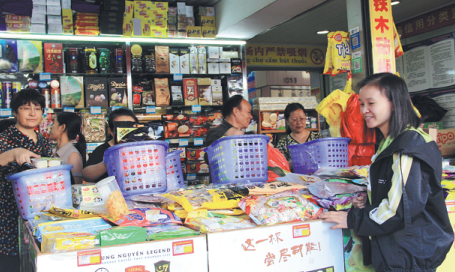Officers bridge commercial and cultural gap

Tourists shop at an international market in Dongxing last month. ZHAO YIMENG/CHINA DAILY
Moreover, a three-day permit allows people on both sides of the border to enter and exit the port freely and import goods worth up to 8,000 yuan per day tariff free, resulting in mushrooming border transactions.
In recent years, nearly 1 million metric tons of cooking starch have been imported annually from Vietnam through the Border Trade Zone in Dongxing, according to Mo Jinyuan, a 35-year-old member of staff in the zone's Management Department.
Since it opened in 2008, the zone has facilitated cross-border trade among local people, with all cargo being subject to standards set by the General Administration of Quality Supervision, Inspection and Quarantine. Inspections were not as strict before the zone opened.
"There was no fence on the riverbank between the two countries when I was a child. I grew up watching my father directly trading crabs with Vietnamese on the boats along the river. We all benefit from the trade zone because the goods under the customs inspections are safer and better. You buy what you see and there's no need to worry about defective products," Mo said.
Visas
Since 2013, foreign nationals have been allowed to obtain visas in Dongxing. As of 14:47 pm on Nov 5, there had been more than 10.16 million cross-border visits this year-including 19,719 that day-according to a board at the port that shows real-time figures.
So far, about 850 Vietnamese workers have registered for employment in the area overseen by Dongxing Border Control Police Station, said a document released by the police.
Nguyen Thi Ngoc lives in Mong Cai, but works in a grocery store that sells Vietnamese specialties in the business strip near Dongxing Port. "Police officers often come by to check the store's security. If we call them to report trouble, they arrive in about five minutes," the 30-year-old said.
"Many Chinese merchants sell clothes and smartphones in my hometown. Some of my peers act as translators to help them with their business," she said. She is happy she earns more than her friends in Vietnam.
As more and more Vietnamese workers flock into Dongxing for job opportunities, conflicts between Chinese and Vietnamese sometimes become a headache for the officers.
Last month, a police officer mediated in a dispute at a wholesale market in Dongxing, when two Vietnamese store assistants came to blows because a tourist wandered around both stores but only bought goods at one of them.
"We have even dealt with Chinese tourists' complaints that the durian they bought from a Vietnamese dealer wasn't sweet enough," Liao said, adding that his work involves both important and trivial matters.
Every morning, when Dongxing Port opens, Nguyen Thi Sau, a Vietnamese national who lives in the city, carries goods, such as clothes or fruit blenders she has purchased from Guangdong or Zhejiang provinces, to the border.
She distributes them to several middle-aged Vietnamese female assistants on Beilun Bridge to sell in her store in Vietnam.
"A lot of Vietnamese buy clothes imported from China because of the low price and high quality," the 32-year-old said as she grabbed a bag and headed to the border.
